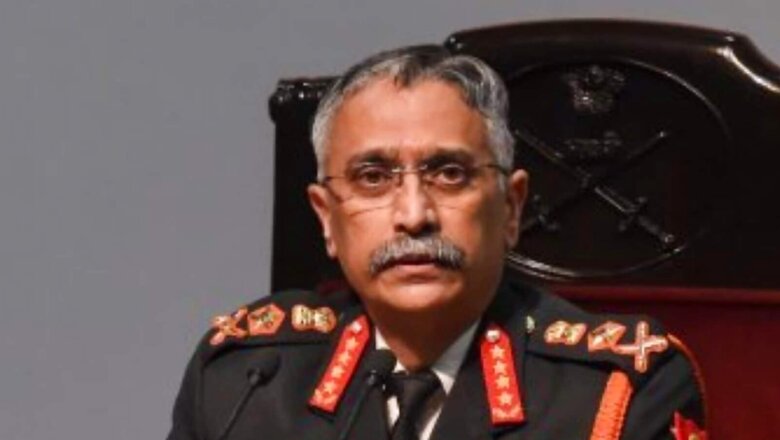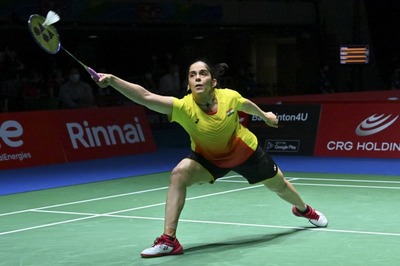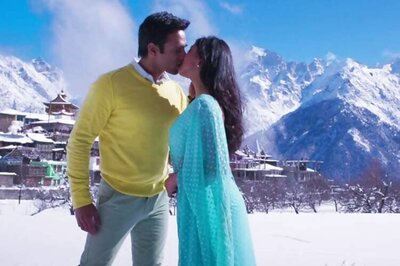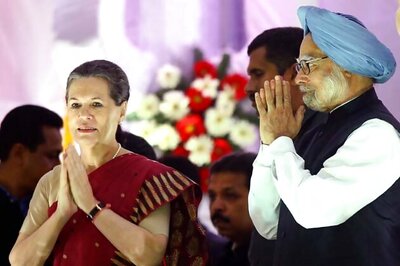
views
Chief of Amry Staff General Manoj Mukund Naravane will hang up his boots on Saturday after over 40 years of service in the Indian Army and 28 months in his last role. As the 27th Army Chief, Naravane was responsible for ensuring the highest standard of operational preparedness to meet present and emerging challenges and develop requisite capacities and infrastructure with special emphasis on northern and NE borders.
Naravane on Saturday laid a wreath at the National War Memorial and received the guard of honour at the South Block lawns before relinquishing his post.
Delhi | General MM Naravane receives guard of honour at the South Block lawns prior to relinquishing as Chief of the Army Staff pic.twitter.com/qnwFOedxUY— ANI (@ANI) April 30, 2022
General MM Naravane was born on April 22, 1960 in Pune and is a son of a former officer in the Indian Air Force. He is an alumnus of National Defence Academy, Pune, and Indian Military Academy, Dehradun. He also has an M.Phil degree in defence studies.
Naravane has served in numerous command and staff appointments in peace, field and highly active counter-insurgency environments in Jammu and Kashmir and the Northeast. He also commanded a Rashtriya Rifles battalion in Jammu and Kashmir and an infantry brigade on the eastern front.
Delhi | General MM Naravane lays a wreath at National War Memorial prior to relinquishing as Chief of the Army Staff pic.twitter.com/luHjnnDEYX— ANI (@ANI) April 30, 2022
After successfully commanding the Army Training Command, Shimla and the Eastern Command that takes care of India’s nearly 4,000-km-long border with China, he held the appointment of Vice Chief of the Army Staff before assuming the appointment of the Chief of the Army Staff on December 31, 2019.
On Saturday, General Manoj Pande took over from Navarane as his successor. He is the 29th Army Chief and the first officer from the Corps of Engineers to get this opportunity.
General Manoj Pande today took over as Chief of Army Staff from General Manoj Mukund Naravane. He is the 29th Army Chief and the first officer from the Corps of Engineers to get this opportunity. pic.twitter.com/tfRqFU9Jsa— ANI (@ANI) April 30, 2022
An eventful tenure
Just over a month after taking charge as the Army Chief, the country saw one of the most violent face-off in Ladakh’s Galwan valley in which 20 Indian soldiers lost their lives. The incident was the starting point for large-scale build-up of Chinese forces along the troops and subsequent stand-off along the Line of Actual Control (LAC).
The LAC standoff with China, reiteration of the ceasefire at the Line of Control (LoC) with Pakistan, and rewriting of the Order of Battle (ORBAT) were some of the issues that made Navarane’s tenure action-packed.
Naravane went about the LAC standoff with a certain level-headedness even while being assertive. “War or conflict is always an instrument of the last resort, but if resorted to, we will come out victorious,” Gen. Naravane said in an online interaction with a group of journalists on the eve of Army Day. However, the Army Chief also said there was always hope that through dialogue we will be able to resolve our differences.
Even when being asked if there would be a war with China, Naravane responded calmly saying army people are the last ones who want to go to war. “It is always better, (to have) the whole of nation approach and have a good relationship with all neighbours, a stable relationship with all neighbours, because if you have stable relations, the country prospers, and that should be the aim.”
In a similar vein, Naravane said that with respect to India-Pakistan ceasefire, peace and tranquillity was the aim. “Ceasefire violations along the border are in no one’s interest. Peace and tranquility all around us is our aim. If the neighbourhood is stable, then we automatically as a nation become safer… The civilian population along the LoC has greatly benefited from the ceasefire, and their quality of life has improved,” he told Indian Express.
On AFSPA, the Army Chief said it was a “whole of government” approach. “We were definitely consulted before AFSPA was lifted from certain areas,” he said.
Naravane is now known to think of holistic approaches to defend the country’s security. In the recent Naval Commanders’ Conference on April 26, he emphasised the need for tri-services convergence, force structuring and a ‘whole of the nation’ approach to deal with national security challenges.
Known to be soft-spoken, reserved and prudent with his words, Gen Naravane diligently focussed on his work rather than building an image. He is known to be a thinker who makes firm decisions and sees them through instead of applying knee-jerk reactions, a profile of Naravane in The Print said.
Read all the Latest India News here



















Comments
0 comment